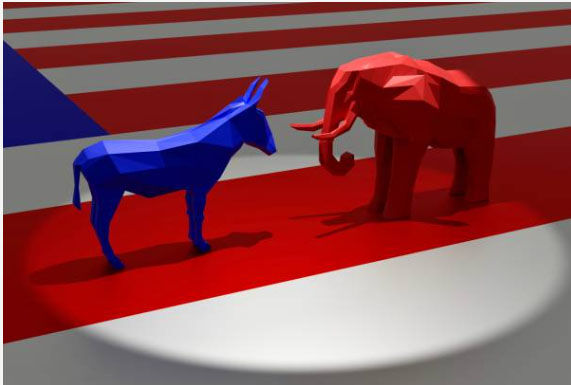Mark Twain and his politics | CRONIN
America’s best-known and most-revered storyteller, Mark Twain (1835-1910), is remembered for his novels, satirical punditry and travel writings, but is rarely thought of as a political thinker and activist.
A lengthy and remarkably revealing new biography by prize-winning author Ron Chernow (“Mark Twain”, Penguin, 2025) highlights Twain’s evolution from a parochial pro-Confederacy, anti-Abolitionist upbringing to a Yankee progressive who used his writings and celebrity voice to speak out on a dozen or more major political controversies.
The new Twain biography will likely encourage many readers, as it did me, to revisit a few of the Twain classics. Twain famously gave us the characters of Tom Sawyer and Huck Finn. Here’s an irresistible sample of his writing from “The Adventures of Tom Sawyer”:
Shortly Tom came upon the juvenile pariah of the village, Huckleberry Finn, son of the town drunkard. Huckleberry was cordially hated and dreaded by all the mothers of the town, because he was idle and lawless and bad — and because all the children admired him so, and delighted in his forbidden society, and wished they dared to be like him. Tom was like the respectable boys in that he envied Huckleberry his outcast condition, and under strict orders not to play with him. So, he played with him every time he got a chance.
A few years later, Twain gave us “The Adventures of Huckleberry Finn.” It celebrates this young rogue outcast, but also uses him as the core of America’s painful coming-of-age story. Twain’s genius was in capturing young Huck and his new friend Jim, a fugitive slave, as they sailed down the Mississippi in search of freedom, common sense, and basic morality. We are inspired to believe people of different races can live, explore, share and dream together and that we can do away with the prejudices of our darker past.
Stay up to speed: Sign up for daily opinion in your inbox Monday-Friday
Eventually, in the book’s climax, Huck is told he will go to hell if he doesn’t turn Jim into the authorities. Huck decides he’d rather just go ahead and burn in hell, if that was to be the cost of protecting Jim’s freedom. “Huck Finn,” together with Harriet Beecher Stowe’s preachy, yet brilliant “Uncle Tom’s Cabin” were America’s best anti-slavery novels of the 19th century. Stowe and Twain were among the few major white writers who seemed to understand and capture the human plight of enslaved African Americans.
Twain liked the underdogs, the rascals and rogues, and he hated organized religion and what he considered the phony do-good Pollyanna stories of Horatio Alger and James Fenimore Cooper.
Twain was raised in the pro-slavery state of Missouri. Most of the white people his town, Hannibal, owned slaves. Twain’s dad struggled financially, but he did practice some law and served as a justice of the peace. His family, even though they were working class, owned slaves. Young Sam Clemens (Twain’s original name) was influenced by the pro-slavery, pro-secession sentiments of his town and family.
But young Sam Clemens was also a prankster, who disliked school and church, and loved playing in and around the Mississippi River as much as he could. He played with Black children of his own age and witnessed the terrible abuse of Black families.
Dropping out of school at age 13, Twain went to work in stores and as a printer. When he was 16, he ran away to New York City, where he obtained printing jobs, and visited Philadelphia and Washington D.C. He was bewildered by and disdainful of the swarms of immigrants in these eastern cities.
Twain returned to Missouri, again working as a printer and for newspapers. His greatest ambition was to become a riverboat pilot, and he successfully earned his steamboat pilot license at age 23. Most of his trips took him from Saint Louis to New Orleans, deep into southern pro-slavery country.
As the Civil War began, Twain came back to Hannibal. He found his home town occupied by Union troops. He was arrested and briefly jailed before escaping.
Soon he volunteered in the Missouri State Guard, which had been organized to protect the state from Union troops. Though technically not a Confederate Army soldier, his unit was aligned with the Confederate mission.
A few weeks after joining up, when his unit’s odds looked bleak, Twain “de-enlisted” and followed his older brother, a pro-Union Republican who was working as a journalist in Iowa. Twain rarely spoke of his brief service in the Civil War, usually trying to joke about it, although obviously regretting even his small role.
Twain’s brother had won a plush Republican Party patronage job as aide to the governor in the Nevada Territory. Twain traveled west with his brother to Carson City, Nevada. Huck tried helping for a while, but soon explored mining and eventually joined the staff of a local newspaper.
It was here in Carson City Twain became a serious journalist, writing about the wild politics in the state legislature and forming his own opinions about what he saw was going on. He also began living a rowdy lifestyle, enjoying the attention he was getting as a young writer. For Twain this was his “State and Local Politics 101” course. He not only wrote about state politics, but he also relished getting involved in local wheeling and dealing.
His Nevada years gave him the attention he always craved. He also got fired and moved on for sojourn in San Francisco. Soon after Nevada became a state in 1864, he was hired an as aide to one its first U.S Senators. He didn’t last long in that job, but he hung around for several months in what was essentially his “Washington semester.” This experience later informed his first novel, “The Gilded Age,” he co-authored with Charles Dudley Warren.
“The Gilded Age” (1873) is a satirical muck-raking exposé of endlessly greedy businessmen and hypocritical, corrupt politicians. It acknowledged the free-wheeling entrepreneurial economic excitement of this period but was a strong indictment of the bribery and political immorality of the times. Ordinary average citizens, the novel suggested, were regularly scammed by the rich and by elected officials, and corporations successfully resisted any meaningful efforts at being regulated.
“The Gilded Age” foreshadowed the Populist and Progressive movements of the coming decades. It was the beginning of Twain’s longtime crusade for civil service reform and his anti-Tammany Hall campaigns.
Twain grew up reading the legends of Robin Hood, and he would later appreciate the social realism of the writers like Hamlin Garland and Upton Sinclair who picked up on his “Gilded Age” themes.
In his mid-30s he married up. His wife’s family, from Elmira, New York was Republican, Abolitionist and wealthy. Her dad amassed a fortune from coal, timber and railroad investments. Twain’s marriage provided great happiness and wealth and helped fund his independence for full-time writing. He became accustomed to a living style that included cooks, maids, butlers and memberships in fancy men’s clubs.
Twain embodied an American paradox: a champion of the underdog, an enemy of greed, but at the same time, a captive of the affluence and luxury his marriage made possible.
His writings and lecture tours and aphorisms began to make him famous. And as he became a celebrity, he became close friends with former President Ulysses S. Grant. Twain helped edit and publish Grant’s best-selling memoirs of the Civil War. He became friends with a host of Union generals, publishing some of their memoirs as well.
Twain became an active Republican and campaigned for candidates such as Rutherford Hayes. Unlike most writers, he enjoyed speaking at rallies and socializing with political as well as business elites. He was also becoming a nationally known orator/humorist. He switched his support to Grover Cleveland, and he would, around 1900, call himself a “Mugwump” and joked vacillation was his forte. He liked neither William McKinley nor William Jennings Bryan and probably didn’t vote that year.
His biographers note Twain still held prejudicial views — cespecially against Native Americans. But he was outspoken against the abuses toward Chinese workers and almost always opposed antisemitism. His many travels abroad encouraged a more sophisticated world view than the sheltered sleepy town of Hannibal gave him.
Twain was angered by the imperialism of McKinley and Teddy Roosevelt. He especially opposed the annexation of the Philippines. This motivated him to serve as the vice president of the American Anti-Imperialist League from 1901 until his death in 1910. Around this time, he also became a friend of Princeton University President Woodrow Wilson.
Much of the Chernow biography documents Twain’s constant worries about finances. Twain was a notoriously inept investor and got involved in several scams that depleted his and his family’s wealth. He would later have to be bailed out several times by a friend who was a Standard Oil tycoon.
The populist Twain cherished his popular acclaim and loved his unexpected friendships with generals, presidents, tycoons and royalty. By mid-life he learned a lot about politics and public affairs. And he developed strong political views — often in conflict with his wealthy friends.
Twain, like most humorists, enjoyed poking fun at politicians. Lampooning the high, mighty and humor-challenged became a passion for him. He also poked fun at the overly pious, sentimental and at organized religion.
Here is a sample of Twain’s political aphorisms — many of which get repeated to this day:
“We have the best government that money can buy.”
“Imagine, if you will, that I am an idiot. Then, imagine that I am also a Congressman. But, alas, I repeat myself.”
“No man’s life, liberty, or property is safe while the legislature is in session.”
“Politicians and diapers must be changed often, and for the same reason.”
“The political and commercial morals of the United States are not merely food for laughter, they are an entire banquet.”
“Patriotism is supporting your country all the time, and your government when it deserves it.”
Twain may have laughed at politics and politicians, but he loved being an American — even though he lived abroad for about a decade and made at least eight vacation trips to Bermuda. He understood politics and the need to take a stand.
He made several trips to Washington D.C. to lobby, including in 1907 to personally lobby for copyright reform. He showed up in Congress and lobbied Teddy Roosevelt in the Oval Office. His reform would be adopted a year or two later.
He may have joked he was a vacillator but here are some of the political causes he wrote and lectured about:
- He was an early champion of woman’s suffrage
- He championed anti-lynching crusades
- He was a vigorous opponent of American imperialism
- He was an outspoken opponent of Tammany Hall-style politics
- He supported the right of workers to unionize
- He championed national efforts for civil service reform
- He criticized discriminatory policies and actions against Chinese workers
- He led efforts in favor of copyright reform
- He wrote a late-in-life novel celebrating Joan of Arc and condemning the Catholic Church for their disgraceful killing of her.
He understood the responsibility we all have for speaking out on behalf of freedom, liberty and social justice. He had come a long way from his youthful rowdyism and racism in provincial Hannibal.
This youthful school dropout would earn the title of being the “father of American literature” from no less than Ernest Hemingway and William Faulkner and the recipient honorary degrees from Oxford and Yale. He may have died 115 years ago, yet many of his stories and ideas are alive and well — and a Twain biography is this week’s No. 1 best-selling non-fiction book in America.
He made us laugh, and he made us think. We could use him now in our contentious political culture — a culture that sadly somewhat resembles his Gilded Age — to mock our own version of greed, hypocrisy, prejudice and fact-challenged political “leaders.”
Tom Cronin writes regularly about Colorado and national politics.
Colorado Politics Must-Reads:












